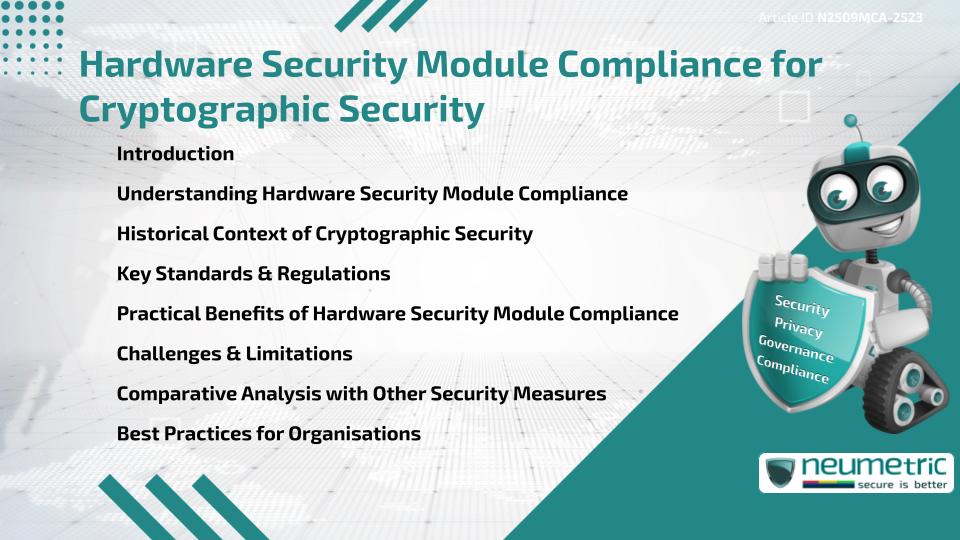Table of Contents
ToggleIntroduction
Hardware security module compliance is essential for ensuring cryptographic security across industries. It provides a Framework for Organisations to protect Sensitive Data, meet regulatory requirements & maintain trust with Stakeholders. This article explores hardware security module compliance, its historical development, the key standards that shape it, practical benefits, challenges & Best Practices for Organisations.
Understanding Hardware Security Module Compliance
A hardware security module [HSM] is a dedicated device designed to safeguard cryptographic keys & perform secure operations. Compliance in this context means that an HSM meets specific security standards such as FIPS 140-2 or Common Criteria. Hardware security module compliance ensures that Organisations use devices that have undergone rigorous testing to verify their ability to resist tampering & attacks.
Historical Context of Cryptographic Security
The need for strong cryptographic security dates back to ancient civilizations, where simple ciphers were used to protect messages. In the modern era, the rise of digital communication & online transactions created a demand for robust cryptographic systems. Hardware security modules emerged as specialized tools to handle encryption, decryption & key management securely. Over time, compliance frameworks were introduced to ensure consistency & trustworthiness across implementations.
Key Standards & Regulations
Several standards define the requirements for hardware security module compliance:
- FIPS 140-2 & FIPS 140-3: Issued by the National Institute of Standards & Technology [NIST], these standards validate cryptographic modules used by Government & private entities.
- Common Criteria: An international Standard for evaluating the security of IT products, including HSMs.
- PCI DSS: Requires the use of compliant HSMs for payment card Data Protection.
- GDPR & HIPAA: Indirectly emphasize the importance of strong cryptographic security, supported by compliant HSMs.
More details on these standards can be found on the NIST website, Common Criteria portal, PCI Security Standards Council, European Data Protection Board & U.S. Department of Health & Human Services.
Practical Benefits of Hardware Security Module Compliance
Organisations gain several benefits from hardware security module compliance:
- Regulatory adherence: Meeting mandatory legal & industry-specific requirements.
- Data Protection: Ensuring encryption keys are stored & managed securely.
- Operational trust: Strengthening Customer & partner confidence.
- Audit readiness: Facilitating smoother compliance audits & Certifications.
Compliance not only reduces Risks but also positions Organisations as trustworthy custodians of Sensitive Data.
Challenges & Limitations
While hardware security module compliance is crucial, it comes with challenges:
- High costs: Acquiring & maintaining compliant HSMs can be expensive.
- Complex integration: Implementing HSMs within existing systems requires specialized expertise.
- Evolving standards: Organisations must continuously monitor & adapt to changes in Compliance Requirements.
These limitations highlight the importance of strategic planning & resource allocation.
Comparative Analysis with Other Security Measures
Unlike software-based key management, hardware security module compliance offers a higher level of assurance against physical tampering. While multi-factor authentication & firewalls play crucial roles, they do not replace the cryptographic protections enabled by compliant HSMs. Instead, hardware security module compliance complements these measures, forming a layered defense strategy.
Best Practices for Organisations
To maximize the value of hardware security module compliance, Organisations should:
- Regularly review Compliance Requirements.
- Train staff on secure cryptographic practices.
- Implement layered security strategies.
- Conduct periodic Third Party audits.
- Establish clear Policies for key lifecycle management.
These practices help maintain both security & compliance in dynamic regulatory environments.
Takeaways
Hardware security module compliance ensures cryptographic security by meeting Industry Standards, reducing Risks & fostering trust. Despite challenges such as costs & integration complexity, Organisations that prioritise compliance benefit from stronger Data Protection & improved Audit readiness.
FAQ
What is hardware security module compliance?
It refers to the process of ensuring that an HSM meets established security standards like FIPS 140-2, Common Criteria & PCI DSS.
Why is hardware security module compliance important?
It ensures secure cryptographic operations, protects Sensitive Data & helps Organisations meet regulatory requirements.
What standards govern hardware security module compliance?
The main standards include FIPS 140-2/3, Common Criteria, PCI DSS & guidelines linked to GDPR & HIPAA.
How does hardware security module compliance compare to software-based security?
HSM compliance offers stronger protection against physical tampering & advanced attacks compared to software-only solutions.
What are the common challenges of hardware security module compliance?
Challenges include high costs, integration complexity & the need to keep up with evolving Compliance Requirements.
Do all industries require hardware security module compliance?
Not all industries mandate it, but sectors like Finance, Healthcare & Government strongly emphasize its importance.
How can Organisations ensure ongoing compliance?
Organisations can ensure ongoing compliance through regular Audits, staff training & Continuous Monitoring of regulatory updates.
Need help for Security, Privacy, Governance & VAPT?
Neumetric provides organisations the necessary help to achieve their Cybersecurity, Compliance, Governance, Privacy, Certifications & Pentesting needs.
Organisations & Businesses, specifically those which provide SaaS & AI Solutions in the Fintech, BFSI & other regulated sectors, usually need a Cybersecurity Partner for meeting & maintaining the ongoing Security & Privacy needs & requirements of their Enterprise Clients & Privacy conscious Customers.
SOC 2, ISO 27001, ISO 42001, NIST, HIPAA, HECVAT, EU GDPR are some of the Frameworks that are served by Fusion – a SaaS, multimodular, multitenant, centralised, automated, Cybersecurity & Compliance Management system.
Neumetric also provides Expert Services for technical security which covers VAPT for Web Applications, APIs, iOS & Android Mobile Apps, Security Testing for AWS & other Cloud Environments & Cloud Infrastructure & other similar scopes.
Reach out to us by Email or filling out the Contact Form…


